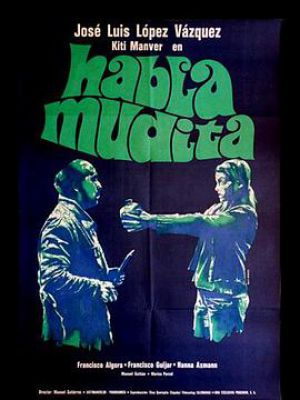说吧,小哑巴

- 别名:小哑巴开口吧 / Don Ramiro / Speak, Little Mute Girl
- 类型:剧情
- 导演:ManuelGuti閞rezArag髇
- 编剧:何塞·路易斯·加西亚·桑切斯/曼努埃尔·古铁雷斯·阿拉贡
- 主演:JoséLuisLópezVázquez/KitiManver
- 制片地区:西班牙 / 西德
- 影乐酷ID:5060958dv
- IMDB:tt0039442
- 片长:88 分钟
- 上映:1974-02-18
- 国内票房¥:暂无
- 全球票房$:暂无
- 简介:西班牙导演阿拉贡的处女作,获柏林影展甘地奖和最佳导演提名。阿拉贡是处在60年代以CARLOS SAURA为首的“西班牙新浪潮”和80年代以阿尔莫多瓦为主的“新西班牙电影”之间的一代。 This Spanish drama explores an encounter between a well-educated mountain-climber and a young shepherdess who has been kept mute by her suffocating family. Lost during a climbing expedition, Don Ramiro (Jose Luis Lopez Vazquez) finds shelter and safety through the help of the speechless girl (Kili Manyer). Though her brother is deaf and half-mad, there is nothing wrong with the girl, and Ramiro begins to teach her how to speak. This interferes with the established pattern preferred by the girl's family, and Ramiro is accused of rape and carted off to prison. The 1973 release of Habla, mudita marked both the end of Spain's miracle years and the beginning of environmentalism in Spain. The film, which hinges on an encounter between the urban and the rural, is set in the wilderness of Northern Spain. The urban gaze, which stands in both fear and awe of the landscape, enunciates Northern wilderness as its Other. For Levinas, the Other is infinite: it should be preserved in all its irreducible strangeness and lie beyond the comprehension of the subject. Although not explicitly spatial in his thinking, Levinas's writing serves as a useful framework for the elusive, powerful vision of nature that the film advances. Via poetic visual language, the Northern Spanish landscape is represented as a mysteriously remote terrain, positioned beyond the reach of the urban gaze. In seeking to preserve the landscape as the 'infinite Other', the film articulates an anxiety towards both the ecological fallout of industrialisation and the demise of Spanish rural life. 马努埃尔·古铁雷斯·阿拉贡(Manuel Gutiérrez Aragón)1942年出生,1969年编剧并导演了他的第一部短片,截止2006年他共编导了近30部电影,获得许多国际大奖。从1973年的《Habla, mudita》至今,他共获得6次柏林国际电影节金熊奖提名,并于1977年凭借《Camada negra》获得柏林国际电影节最佳导演银熊奖。2004年他凭借《Vida que te espera, La》获得Turia奖特别大奖,以及柏林国际电影节金熊奖和卡塔赫纳电影节最佳影片奖提名。2006年他担任了第九届上海国际电影节“金爵”奖国际评委。











